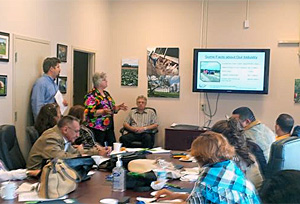Cuba’s food economy is on the verge of its most significant change in decades: the infusion of a small, non-state private sector to kickstart local production in a country that presently imports 80 per cent of its food.
Last year, the Canadian International Development Agency (CIDA) announced a $5-million initiative, led by Dal’s Faculty of Management, to support the Cuban government in improving local economic development and enhancing food security in four Cuban provinces. As part of the project, 24 Cubans will be spending two weeks in Canada each year, connecting with researchers, government agencies and food producers to consider approaches that could be applied in their home country.
This summer, Dal welcomed the first delegation of the Local Economic Growth and Food Security Project. The four individuals were the Cuban co-leads on each of the project’s four key areas: support for local entrepreneurs, public administration, local economic development and industrial symbiosis.
“It’s a key component of the project, in that they get a chance to come to Canada and understand how we look at food security, food access, local economic development and government support activities in our country,” explains Martine Durier-Copp, co-director of the project and director of Dal’s Centre for Advanced Management Education.
“We do not, in any way, expect that the Canadian model is going to be replicated; that’s not the intent at all. It’s to show them some options… to broaden their sphere of reference in terms of how these issues are tackled by other jurisdictions.”
Sharing expertise
The delegation was in the Maritimes from July 21 until August 3. The guests‚Äô itinerary was jam-packed, and included visits to Dal‚Äôs Faculty of Agriculture; the Nova Scotia Department of Agriculture; AVæ„¿÷≤ø‚Äôs Centre for Family Business and Regional Prosperity; Mount Saint Vincent University‚Äôs Centre for Women in Business; the Centre for Entrepreneurship Education and Development; the Canadian Food Inspection Agency; and various local farms and food producers.
 “We’re taking very good experiences from the co-operative centres: how they perform applied research, how they use science and innovation towards local economic development, and the belief in social and economic sustainability in local communities,” said Yadiris del Valle Atala from the Universidad de Guantanamo. “From the experience we have in Cuba in sustainable agriculture and ecology, we think we can have closer links in terms of exchanges, training, and mentoring for technology transfer.”
“We’re taking very good experiences from the co-operative centres: how they perform applied research, how they use science and innovation towards local economic development, and the belief in social and economic sustainability in local communities,” said Yadiris del Valle Atala from the Universidad de Guantanamo. “From the experience we have in Cuba in sustainable agriculture and ecology, we think we can have closer links in terms of exchanges, training, and mentoring for technology transfer.”
The delegates took particular note of the strong role universities like Dal and the Université de Moncton (which is also participating in the project) play in supporting the region’s agricultural economy.
‚ÄúThere is a synergy between the strategies of the local community and the universities,‚Äù said Eliccor Castro Contreras of the Universidad de Gronma. ‚ÄúThat is a big responsibility that [AVæ„¿÷≤ø] University has in the world. We‚Äôve been able to learn and exchange about that responsibility.‚Äù
Dr. Durier-Copp says the visit was “extremely successful,” with great feedback from the delegates. Since the program’s focus is on creating training programs that can be implemented in Cuba, the next step for the co-leads is designing curricula that can be launched in 2014. There will also be two, more specialized delegations visiting our region later this year.
“There’s something that always comes out in the solidarity between Canada and Cuba,” adds Dr. Durier-Copp. “There’s a connection between Canada and Cuba that really stands out when we have these visitors here.”

